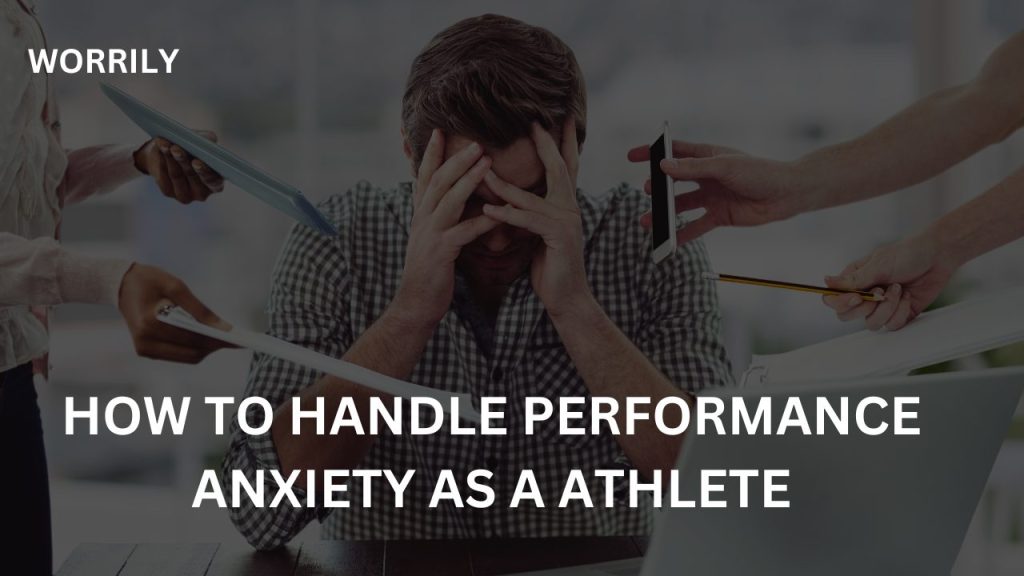Athletes may experience performance anxiety as a huge problem that interferes with everything from training to competition.
It’s that feeling in the back of your throat before a big game, the beating of your heart at a crucial point, or the annoying ideas that divert your attention when you need to focus. You’re not the only one who has ever felt this intense pressure.
These emotions are common among athletes, and they may affect both their performance and happiness of the game. This blog post will discuss useful strategies for managing performance anxiety, offer resources to help you recover your confidence.
Understanding Performance Anxiety
It’s critical to understand the true nature of performance anxiety before going into solutions. In situations of competition, a mixture of pressure and anxiety may arise.
This anxiety can be brought on by a fear of failing, concerns about friend or coach criticism, or a desire to live up to either internal or external requirements. It can be devastating, making some athletes unable to perform when it matters most.
Strategies to Handle Performance Anxiety
1. Preparation is Key
Being prepared helps reduce anxiety. Athletes should establish a disciplined training schedule that incorporates mental exercises like methods of visualization as well as physical activities. Imagining achievement contributes to a happy attitude.
2. Breathing Techniques
Before a game, simple breathing techniques might help reduce anxiety. You can divert your attention from worrying thoughts by concentrating on your breathing.
Try the 4-7-8 method, which involves taking a four-second breath, holding it for seven, and then letting it out for eight. You focus on yourself and gain mental clarity by using this technique.
3. Mindfulness and Meditation
Anxiety can be considerably decreased by incorporating meditation into your daily practice. Even ten minutes a day of meditation will help you understand your emotions without passing judgment, which will help you remain in the present moment when playing sports.
4. Positive Self-Talk
It matters how you speak to yourself. Use affirmations like “I am prepared” and “I have the skills to succeed” to counter negative thinking. This mental shift could increase your confidence substantially.
5. Seek Support
Speaking with an athletic psychologist, coach, or teammate can have a big impact. Expressing your emotions can offer comfort and understanding, making you feel less alone in your difficulties.
6.Set Realistic Goals
Excessive pressure can be reduced by setting modest, attainable goals. You might enjoy the sport more if you focus on your own accomplishments rather than winning.
FAQs:
How to Handle Anxiety as an Athlete?
Athletes can manage their anxiety by using deep breathing exercises and meditation, which assist to focus the mind and relax muscle tension. Confidence can also be increased by training and strict preparation.
How to Cope with Performance Anxiety?
Developing a pre-performance routine, establishing reasonable goals, and engaging in constructive self-talk are all part of overcoming performance anxiety. Another way to reduce pressure is to imagine success.
How Does Anxiety Affect the Performance of Athletes?
Anxiety can affect performance by decreasing concentration, increasing levels of stress, and causing poor decision-making. It could lead to athletes performing poorly or feeling overburdened under pressure.
What is Performance Anxiety in Sport?
The worry of failing or falling short of standards during a competition is known as performance anxiety, and it can cause both mental and physical discomfort. In addition to physically signs like a beating heart, it can show up as anxiety and self-doubt.
Conclusion
Performance anxiety is a common problems that may be overcome with the right solutions. Athletes can learn to effectively manage performance anxiety by setting realistic goals, practicing mindfulness, using positive self-talk, and thoroughly preparing. Remind yourself that you don’t have to face this alone and that it’s acceptable to ask for help.
Whether you’re a seasoned athlete or just starting out, addressing anxiety is crucial for your performance and overall well-being.
The journey might not be easy, but with persistence and the right tools, you can take control of your anxiety and enjoy your sport to the fullest.
For further reading on performance anxiety and mental wellness in sports, check out these resources from reputable organizations: American Psychological Association, Mental Health Foundation, and Sports Psychology International.
If you’re struggling with performance anxiety and need additional support, consider seeking online therapy. Professional guidance can help you develop effective coping strategies and build resilience. Don’t let anxiety hold you back—take the first step towards a more confident and enjoyable athletic experience today. Find a therapist online now!
